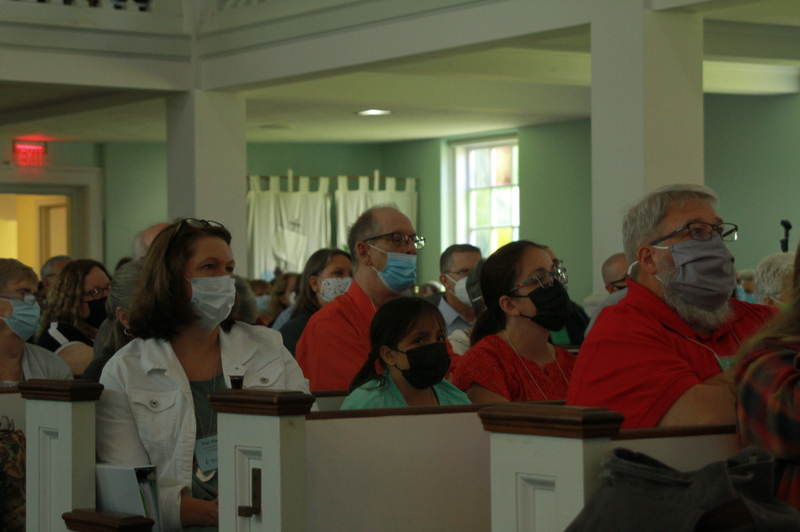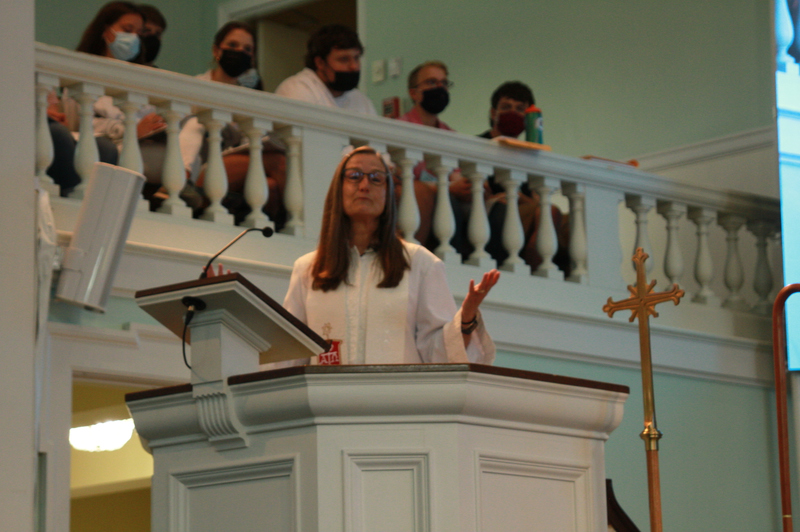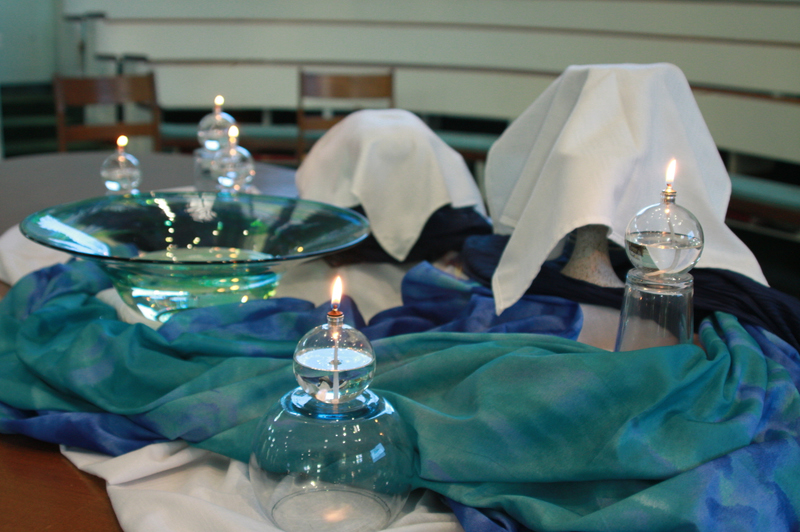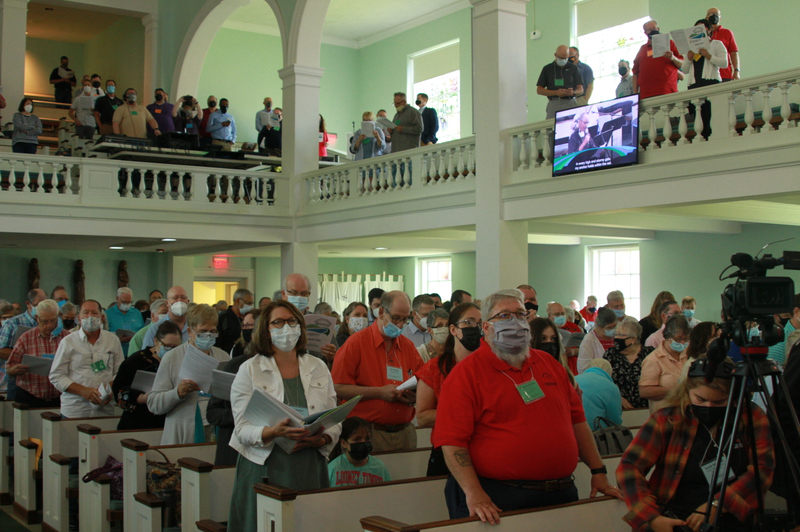“Ever feel like you need a hope transfusion?”
Bishop Sandra Steiner Ball posed the question to a congregation of more than (500) gathered at Wesley Chapel on the campus of West Virginia Wesleyan College and online for the opening worship of the 2022 West Virginia Annual Conference.
This year marks the 176th annual conference session as the oldest continuous unit, the 54th as a united conference, and the first annual conference since 2019 to return to a regular in-person voting, gathering and worship format, though masks were required as a Covid precaution.
“What a time we’ve had,” Steiner Ball said, commenting not only on the virus pandemic but on pandemics of “racism, elitism and superiority … and now, in the last few months, … of gun violence.”
Friday’s service of lament and hope included liturgical readings focused on the issues of Covid-19, substance use disorder, racism, loneliness, conflict, denominational struggles, hunger and poverty.
“Yes. Lament,” the bishop said. “Lament the struggles, the challenges, the evil, but remember … a true lament calls us to remember the steadfast love of the Lord and therefore to have hope. Do not sway. Do not let go. Do not be devoid of hope, the hope that we as Christians possess.”
Steiner Ball’s message was echoed in the hymns “Gather Us In,” and “My Hope is Built on Nothing Less,” the praise music of Logan Memorial Praise Band, and in the reading of scriptures from Psalm 10, Lamentations 3:22-26, Revelation 21:4, and Romans 8:24.
“Hope that is seen is no hope at all,” she said. “Who hopes for what they already have? Hope moves us beyond the present. Hope moves us out of the brokenness and pain and trauma that we have been experiencing.”
She asked the congregation to remember how God has been with them in trying times and to use memory to inform their faith and shape their hope.
“In light of the past years, there are many things we thought impossible that are now known and are commonplace,” Steiner Ball said, mentioning virtual worship, online meetings, outdoor sanctuaries, business shut-downs, vaccinations and other things believed to be nearly impossible pre-pandemic. “If Jesus calls you to do something, Jesus will make it possible for you to do it. Nothing is impossible if Jesus wills it. … All the impossible is, is something that hasn’t happened yet.
“In light of all the impossible things that we have discovered now are possible, it is nearly impossible to speculate as to what is actually impossible, for anything could become possible in a short time,” she said, calling on the congregation to “bring the power of Christ into the picture” and to have hope.
“We need hope. Hope is the power that delivers us from the temptation to wallow in the negative stuff,” she said.
We know that we can have hope, she added, because God has promised it, and he is faithful. “His faithfulness is with us all the time. … It’s not about us, it’s about God’s promise made known in Christ.”
Steiner Ball asked the congregation to remember that promise as they build bridges, connections and partnerships beyond their wildest dreams.
“In your communities, can you bring hope to the possibilities that haven’t been seen and experienced yet? Certainly you can!
“ … Are you hoping, expecting to reach new people?” Steiner Ball continued. “Hope causes us to prioritize, gives us the courage to change, to give up our ways, our comforts and even our certainties for the way of Christ. … Hope. It is the anchor of our souls. … It is our pathway to reaching and bringing new people to Christ and God’s kingdom. What are you hoping for?”
The theme of hope continued throughout the ecumentical greeting presented by Bishop Matthew Rigel of the Evangelical Lutheran Church in America.
Rigel pointed out, with humor, that human promises are always conditional on the possibility of death. (He noted that his motorcycle ride to Buckhannon from Pennsylvania had the potential to leave his promise to speak at conference unfulfilled.)
“The only one whose promises aren’t conditioned is the one who has died and is dead no longer,” Rigel said.
“Did I not tell you that I am going to prepare a place for you,” Rigel said, quoting Jesus. “And what a place he has promised.”
Rigel, attributing the comparison to a friend, likened that promised place to “a party thrown by the son, at the father’s house, with the Holy Spirit on tap.”
“This is our hope,” he said prior to a communion service. “It is not in this life that we hope. This is the future that draws us to itself.”
Holy communion gives us a taste of that future, he said, mentioning his fondness for ring bologna appetizers in a unique metaphor that compared the work of the Holy Spirit with hors d’oeuvres. “We have it in the holy Eucharist, the foretaste of the feast to come.”
“In this hope, this sweet hope of knowing what is in store for us and knowing that we might enjoy a foretaste now, we are confronted with the realization that hope is painful,” Rigel said. “ … To hope is to know pain. We are simultaneously raptured and damned.”
He pointed out that Christians remain in a state of transcendent bliss, yet with anguish and deep groaning — like a child before Christmas, a ketchup fan waiting on the taste of Heinz, or a bride and groom in “hopeful anguish” awaiting the end of their ceremony and reception.
“And we, brothers and sisters, as the bride of Christ awaiting the conclusion of this era and this epoch … to be embraced by our sweet Lord Jesus. … Knowing that these things are here and they’re almost within our grasp, we groan in anticipation.
“There is lament and there is hope,” Rigel continued. “And with hope comes a new type of groaning. It is not the groaning of lament, it is the groaning of anticipation. Lord, hasten the day when our groaning shall cease.”
In addition to communion, Friday’s service included a welcome from Dr. Elle High, chair of the WVUMC Committee on Native American Ministries. High’s words and an accompanying video acknowledged that the conference and its churches meet and pray on the traditional homelands of indigenous people, “land already sacred before we arrived.”



